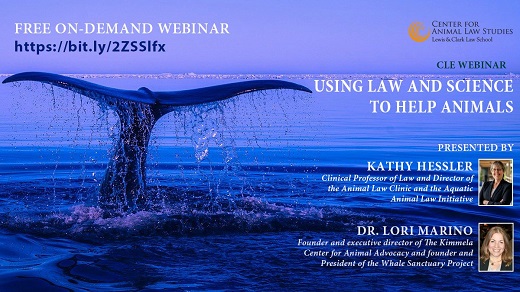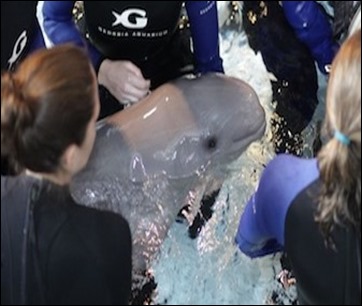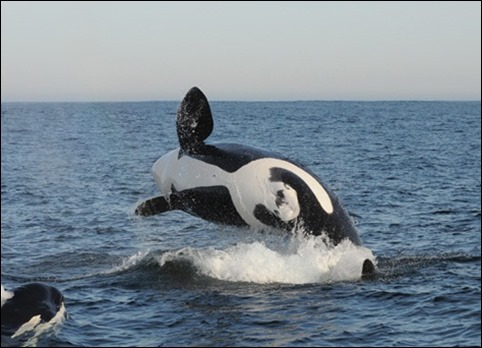By Lori Marino
Last Friday, June 5th, an infant beluga whale born to Maris and Beethoven at the Georgia Aquarium took her last breath. The whale was 26 days old, and the second infant from the same parents to die at the aquarium in three years. The first one, her sister, died less than a week after she was born.
The senior veterinarian and the care staff at the Georgia Aquarium all seem baffled by the early death of yet another infant beluga. According to the aquarium, the infant was not feeding well and not gaining weight as expected. She became lethargic and then her heart stopped. The aquarium told the Atlanta Journal Constitution that her death “may remain a mystery.”
But this death is not a mystery at all. It’s a classic case of the well-known medical condition Failure To Thrive Syndrome. FTTS is seen in human children and other animals (it’s known as Fading Puppy and Kitten Syndrome in dogs and cats) when they fail to develop normally both physically and mentally.
The syndrome is associated with many diseases, but also with environmental conditions in which a child is either abused or neglected, and is not uncommon in orphanages. It’s also seen in other cognitively complex mammals, such as chimpanzees and elephants, who are kept in artificial conditions. So, the care staff at the aquarium need look no further than their Merck Manual of Medicine to find the answer to the question of why beluga whales do not reproduce well in aquaria and theme parks.
Why do so many marine mammals succumb to FTTS in captivity? Initially, this birth was hailed as the first successful breeding of two captive beluga whales, raising hopes among aquariums that they would be able to find a solution to their dwindling captive populations. But the facts make it perfectly clear why these breeding attempts keep failing and why beluga whales growing up in marine parks will never work.
Beluga whales are highly intelligent, socially complex mammals with brains over two and a half times the size expected for their body mass. Like other smart mammals, they depend upon a long period of learning to assume their roles as parents, siblings, friends and members of their social networks. They’ve adapted to living in fluid groups that in the open ocean can range from just a few individuals to sometimes thousands.
In the wild, a daughter learns from her mother and from other experienced females how to become a mother and raise her own children.
In the wild, female belugas choose when and with whom they want to mate. Their calves remain close to them for 4-5 years or more, during which time a daughter learns from her mother and from other experienced females in the group how to become a mother and raise her own children. When she eventually gives birth, other females in the extended family are present to assist in forming protected and caring nursery groups. This is beluga whale culture. These are the circumstances to which these whales have adapted over millions of years and that they need in order to thrive.
Now look at the situation at the Georgia Aquarium. Maris, the 20-year-old mother, was born at the New York Aquarium, where she was housed with other belugas who were stolen from their wild families. Her mother, Natasha, was taken from her family when she was only four years old. So Maris never had the benefit of a mother who could pass on important cultural information to her about how to raise a child.
Still barely out of childhood, Maris has been transported five times in and out of different facilities. At the Georgia Aquarium she was forced into a situation that left her little choice than to mate with a male, Beethoven, who was chosen not by her, but by the staff. (Beethoven is now on “breeding loan” to Shedd Aquarium in Chicago).
For Maris, there was no autonomy, no continuity, and no opportunity to develop within a natural social and physical environment. She and her two infants were all born into an entirely unnatural world, one to which they are not adapted. One need only see the photographs of the infant beluga surrounded by several humans in wet suits. The Georgia Aquarium describes these scenes as being in the “arms of caregivers”. Although intentions might be good, the presence of humans is not a condition to which infant beluga whales are adapted, and it’s doubtful that either the baby or her mother experienced these human intrusions as the warm and comforting interactions the aquarium claims they were.
Studies of welfare in captive belugas support the assertion that belugas cannot live, let alone thrive, in a setting in which they never evolved. In captivity their lives are shorter and mortality rates are higher. They often die of stress-related diseases which break down their immune system function. They fail to thrive.
So, when the veterinarians and staff at the Georgia Aquarium claim to be flummoxed over the death of two infant belugas, they need look no further than any basic marine mammal ecology textbook to find the answer to why belugas will never thrive in theme parks.



